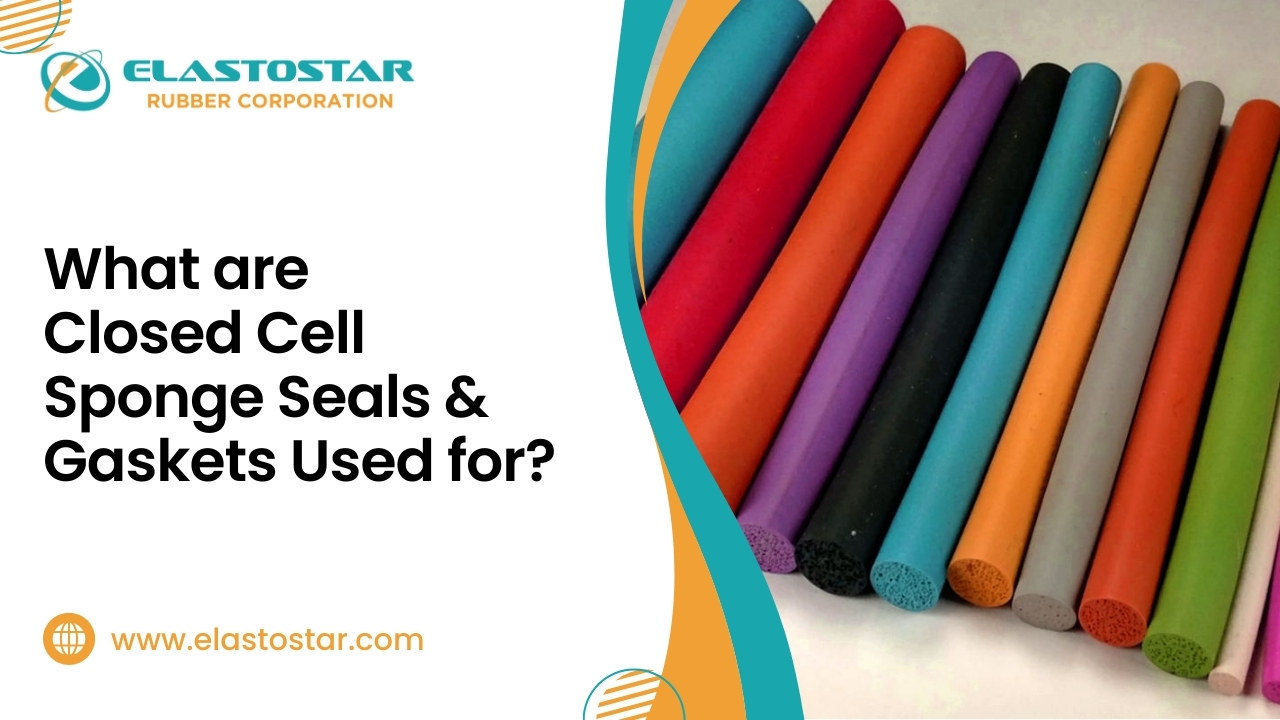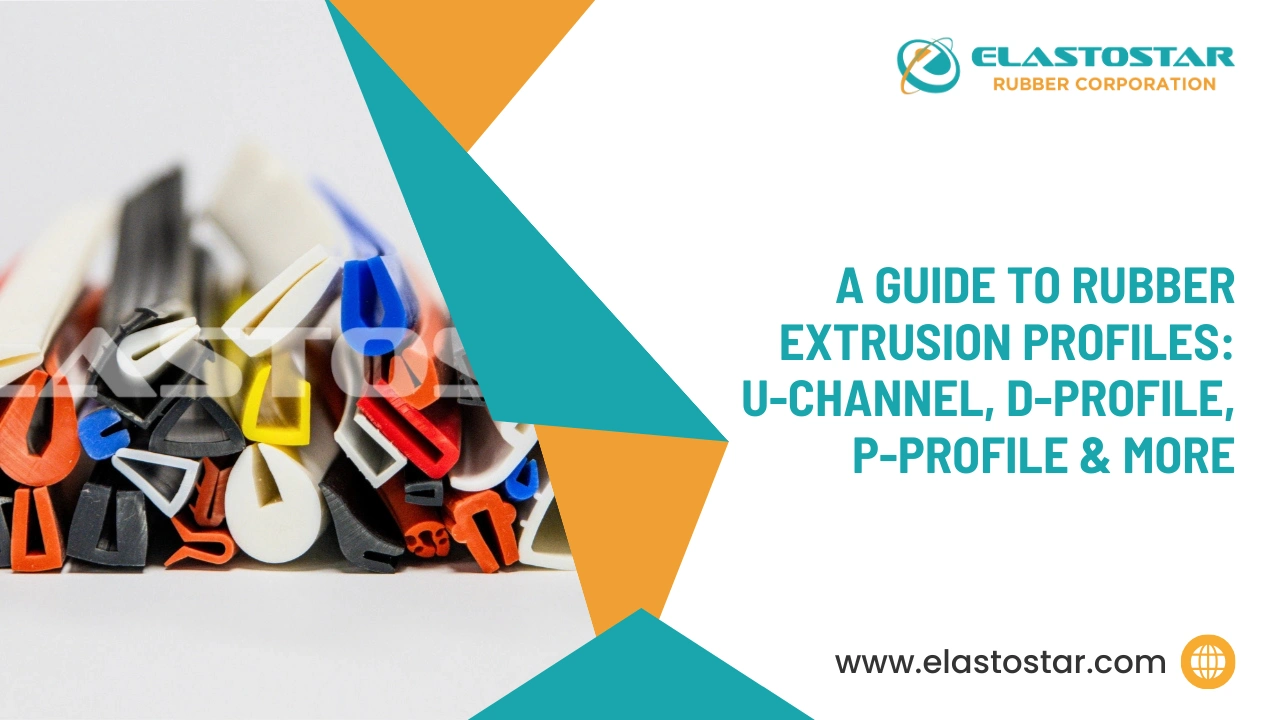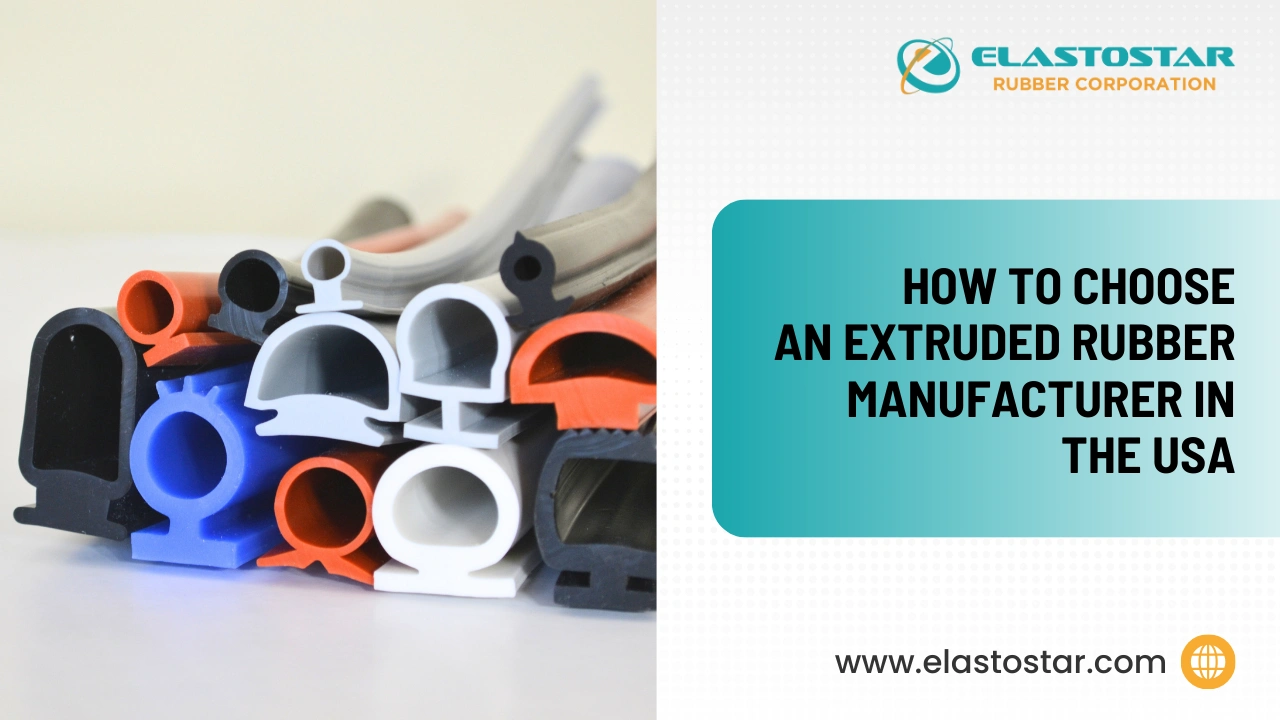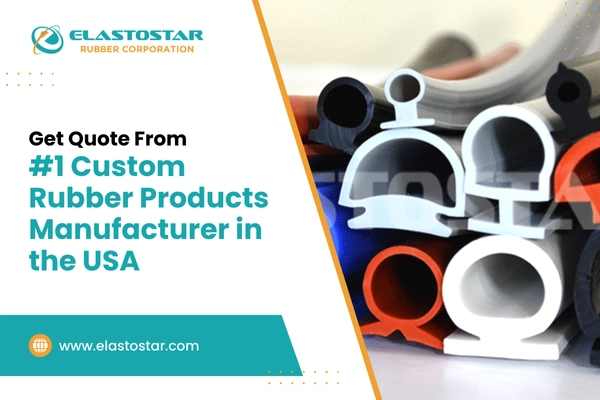Closed cell sponge seals and gaskets are made from sponge rubber with small, enclosed air pockets, making them highly resistant to water, air, and environmental elements. These gaskets are widely used in industries such as automotive, HVAC, and construction for sealing, insulation, and weatherproofing applications. Materials like silicone sponge and closed cell silicone sponge provide excellent protection against moisture and contaminants, ensuring long-lasting performance in demanding environments.
In the next blog, we will explore the different types of sponge rubber materials and their specific advantages across industries.
Table of Contents
What Are Closed Cell Sponge Seals & Gaskets?
Closed cell sponge seals and gaskets are made from a type of sponge rubber that has small, enclosed air pockets. This unique structure makes them highly resistant to water, air, and environmental elements, making them ideal for sealing and insulation in various industries.
Materials like silicone sponge or closed cell silicone sponge are commonly used to manufacture these seals and gaskets. They are excellent for applications requiring waterproofing and air-tight sealing. The closed cell design helps block moisture and contaminants, which is essential for industries such as automotive, HVAC, and construction.
These sponge gaskets are particularly effective in creating a seal sponge that prevents leaks and provides insulation. They can handle different temperatures and conditions, especially when made from durable materials like silicone sponge.
Closed cell sponge seals and gaskets provide a reliable, flexible solution for sealing and insulation, offering long-lasting protection in a variety of applications.
Top 8 Benefits of Closed Cell Sponge Seals
Closed cell sponge seals are widely used in various industries due to their versatile advantages. Made from materials like silicone sponge, sponge rubber, and closed cell silicone sponge, these seals are designed to provide excellent performance in challenging environments.
- Weatherproofing and Environmental Resistance
Closed cell sponge seals, especially those made from closed cell silicone offer superior resistance to environmental elements like water, dust, and air. These seals also resist UV rays, ozone, and oxidation, making them ideal for outdoor applications in industries such as construction and automotive. - Waterproof and Air-Sealing Properties
These seals and gaskets provide effective protection against the entry of water and air. A gasket sponge made from closed cell silicone sponge is commonly used for sealing doors, windows, and electronic enclosures, ensuring a secure waterproof, and airtight fit. - Vibration Dampening
Closed cell sponge rubber gaskets excel in absorbing vibrations, reducing noise, and protecting machinery from wear. This feature is crucial for HVAC applications, where minimizing vibrations helps improve performance and extend the lifespan of the equipment. - Thermal Insulation
Closed cell silicone sponge is known for its excellent thermal insulation properties, which help regulate temperatures in applications such as HVAC systems. In high-temperature environments, high temperature silicone sponge is particularly valuable, as it can withstand extreme heat and cold, making it suitable for demanding industries like aerospace and manufacturing. - Chemical Resistance
Certain sponge rubber materials, like silicone sponge rubber and neoprene, are resistant to oils, fuels, and chemicals. This makes closed cell sponge seals an ideal solution for automotive and industrial applications where they may be exposed to harsh chemicals. Custom rubber sponge extrusion can also be designed to meet specific chemical resistance needs. - Compression Set Resistance
It maintains its shape even after being subjected to prolonged pressure, which prevents permanent deformation. This feature is especially important for sponge rubber gaskets used in applications that require consistent sealing over time, such as in machinery and heavy equipment. - Lightweight and Flexible
Despite their durability, closed cell sponge seals are lightweight and flexible, making them easy to install in various applications. Rubber sponge extrusion can be custom-shaped to fit specific design needs, ensuring a secure and accurate fit for any application. - Durability in Extreme Temperatures
It is specifically designed to endure both high and low temperatures without losing its effectiveness. This makes closed cell silicone ideal for industries that require seals to perform reliably in extreme environments, such as aerospace, electronics, and industrial manufacturing.
Closed Cell Sponge Gaskets vs. Open Cell Gaskets
Choosing between closed cell sponge gaskets and open cell gaskets depends on the specific requirements of your application. Both types of gaskets serve different purposes, and here’s a simple comparison to help you decide which one is best suited for your needs.
- Closed Cell Sponge Gaskets
Closed cell sponge gaskets are designed to provide excellent protection against water, air, and other environmental factors. Made from materials like silicone sponge and sponge rubber, these gaskets have a structure where the air pockets are sealed, making them highly resistant to moisture and air penetration. They are commonly used for applications such as door sponge seal and sponge rubber tubing in HVAC and automotive industries, where sealing is crucial.
When to Use Closed Cell Gaskets?- In situations where you need waterproofing or protection from liquids.
- For applications requiring air-tight seals, like silicone sponge gaskets for automotive systems.
- In outdoor environments, where the gasket may be exposed to water, UV rays, or temperature changes.
- Open Cell Gaskets
Open cell gaskets have interconnected air pockets that allow air and moisture to pass through. These gaskets are less effective at sealing against water but are useful in applications that require breathability and cushioning. While closed cell gaskets are better for blocking water, open cell gaskets are used for ventilation or cushioning purposes.
When to Use Open Cell Gaskets?- In applications where breathability is needed, such as foam padding or air filtration.
- In indoor settings where water resistance and sealing aren’t primary concerns.
- For cushioning or shock absorption where airflow or moisture evaporation is important.
Industries That Use Closed Cell Sponge Gaskets
Closed cell sponge gaskets are widely used across various industries due to their excellent sealing, insulation, and waterproofing properties.
- Automotive Industry
In the automotive sector, closed cell sponge gaskets are commonly used in door sponge rubber seals and engine compartments. These gaskets help keep water, dust, and air from entering vehicles, ensuring a comfortable interior and protecting engine components. Sponge rubber materials are often used due to their durability and resistance to temperature changes, making them ideal for door seal sponge applications. - HVAC Systems
Closed cell silicone sponge gaskets are important in HVAC systems, where they are used for duct sealing to prevent air leaks and improve energy efficiency. These gasket sponge materials provide effective thermal insulation, helping maintain consistent indoor temperatures and reducing energy consumption. - Marine Industry
In the marine industry, closed cell sponge gaskets are essential for waterproofing and weather-resistant applications. These gaskets are used in boat hatches, windows, and other areas that are exposed to water. - Construction Industry
The construction sector relies on sponge rubber gaskets for sealing gaps in windows, doors, and other structural components. Sponge window seals and door sponge rubber seals help improve energy efficiency by providing thermal insulation and preventing air and moisture infiltration.
| Industry | Common Uses | Material Benefits |
| Automotive | Door seals, vibration control | Air and water resistance |
| HVAC | Duct sealing, insulation | Energy efficiency, noise reduction |
| Marine | Waterproof seals, hatch gaskets | UV and water resistance |
| Construction | Sealing gaps, weatherproofing | Thermal insulation, durability |
Types of Closed Cell Sponge Rubber Materials
Closed cell sponge seals are manufactured from a variety of materials, each offering distinct advantages based on the application.
- Neoprene
Neoprene is a popular choice for closed cell sponge gaskets because of its excellent resistance to oil, chemicals, and weather conditions. It is commonly used in automotive and industrial applications where durability and protection against harsh environments are required. - EPDM
EPDM is well known for its ability to resist UV rays, ozone, and extreme weather conditions, making it ideal for outdoor and construction uses. It’s often used in sponge window seals and closed cell foam gaskets because it can handle constant exposure to sunlight and fluctuating temperatures without degrading. - Silicone
Silicone sponge is widely used for applications requiring high heat resistance and flexibility. With a temperature range from -150°F to 500°F, sponge silicone rubber can withstand extreme conditions while maintaining its sealing properties. It is highly effective in industries like electronics, medical devices, and food processing.
You can also -read our blog about:
Difference Between Closed Cell Silicone Sponge Vs. Dense Silicone Rubber
Comparison Table for Closed Cell Sponge Materials
| Material | Temperature Range | Resistance To | Common Applications |
| Neoprene | -40°F to 230°F | Oil, chemicals, weather | Automotive, industrial, sponge rubber tubing |
| EPDM | -60°F to 300°F | UV, ozone, weather | Outdoor, construction, sponge window seal |
| Silicone | -150°F to 500°F | High heat, flexibility | Electronics, medical, food, closed cell foam gasket |
Installing and Maintaining Closed Cell Sponge Seals
Proper installation and maintenance of closed cell sponge seals are essential for ensuring their long-term performance and durability.
- Avoid Over-Compression
Over-compressing the gasket can damage the material and reduce its ability to seal effectively. When installing, ensure the closed cell sponge is compressed just enough to create a seal without flattening it completely. This helps maintain the gasket’s integrity and ensures it can perform as expected over time. - Regular Inspections
Conduct regular checks for any signs of wear, damage, or deformation. This is particularly important in high-stress applications where the gasket is exposed to harsh conditions. Inspecting sponge rubber and silicone sponge materials periodically can help you spot issues early and replace seals as needed to avoid failure.
By following these simple steps, you can extend the life of your closed cell sponge seals and maintain optimal sealing performance for your application.
How Closed Cell Sponge Gaskets Handle Harsh Environments
Closed cell sponge gaskets are highly valued for their superior environmental resistance, making them ideal for use in outdoor or extreme conditions. Their closed cell structure effectively blocks water, air, and contaminants, ensuring long-lasting performance in demanding environments.
- Water Resistance
The closed cell sponge design prevents water absorption, making these gaskets perfect for applications exposed to moisture, such as door seal sponge installations or outdoor equipment. This feature is crucial in industries like marine and construction where water resistance is key. - UV and Ozone Resistance
Materials like sponge rubber and silicone sponge offer excellent protection against UV rays and ozone, making them ideal for outdoor use. These gaskets are commonly used in applications exposed to constant sunlight, ensuring they maintain their integrity over time. EPDM and high temperature silicone sponge are particularly resistant to weathering and UV exposure, making them reliable in outdoor conditions. - Temperature Resistance
High temperature silicone sponge can handle a wide range of temperatures, making it suitable for environments with extreme heat or cold. It performs well in automotive and electronics applications where consistent sealing is needed under fluctuating temperature conditions. - Flame Retardancy
For applications requiring fire resistance, the UL 94 V-0 flame retardant silicone sponge provides protection against flames and helps meet safety standards. This material is often used in industries where flame resistance is critical, offering added safety in harsh environments. - Weather Resistance
Seal sponge materials, especially sponge rubber, are resistant to damage from wind, rain, and snow, making them ideal for outdoor sealing applications such as door seal sponge systems and weatherproofing equipment. They are designed to withstand prolonged exposure to harsh weather conditions without deteriorating.
Selecting the Best Closed Cell Sponge Gasket
Choosing the right closed cell sponge gasket is essential to ensure proper sealing and durability in your application.
- Temperature Resistance
If your application involves high temperatures, a silicone sponge is the best choice due to its ability to handle extreme heat. For moderate temperatures, sponge rubber is commonly used in automotive and outdoor environments. - Compression Set
For applications where the gasket is compressed frequently, you’ll need a material with a low compression set. Sponge silicone rubber maintains its shape even after repeated compression, ensuring reliable performance over time. - Chemical Exposure
In environments with exposure to oils or chemicals, neoprene is a great option for its chemical resistance. For outdoor applications, EPDM provides excellent resistance to UV rays and weathering. Silicone sponge gaskets are also ideal for high-temperature or chemically sensitive environments.
How to Choose the Best from Elastostar Rubber Corporation
Elastostar Rubber Corporation provides a wide selection of high-quality closed cell sponge materials, including sponge rubber, silicone sponge, and sponge rubber gaskets. With- our expertise, -we can help you select the ideal gasket sponge based on the specific requirements of your application, ensuring optimal performance and long-lasting durability.
Our materials are tested and compliant with USP CLVI and USP CLVI Section 88 & 87 standards, ensuring the highest quality and safety. Our knowledgeable team is committed to helping you find the best solution for your needs across various industries, from automotive to construction and beyond.
Recommended Reads
- How to Choose the Best Rubber Gasket for Your Windows
- What are the different Types of Gaskets and Seals?
- Top 10 Properties of Rubber That Make it Ideal for Seals & Gaskets

Conclusion
Closed cell sponge seals and gaskets provide excellent performance across a variety of industries, offering benefits like waterproofing, thermal insulation, and vibration dampening. Made from materials such as silicone sponge and sponge rubber, they are ideal for demanding applications in automotive, HVAC, and construction. With their resistance to harsh environmental conditions, including UV, chemicals, and extreme temperatures, closed cell sponge gaskets ensure long-lasting durability.
FAQs
- Why are gaskets used?
Gaskets are used to create a secure seal between two surfaces, preventing the leakage of liquids, gases, or contaminants. Elastostar Rubber Corporation offers high-quality closed cell sponge gaskets for sealing needs across various industries. - What is the difference between an open cell and a closed cell?
Open cell foam allows air and moisture to pass through, while closed cell foam is denser, providing superior waterproofing and insulation, like a closed cell silicone sponge. - How to identify closed-cell foam?
Closed cell foam has tightly packed air pockets, making it more rigid and resistant to water and air. Elastostar Rubber Corporation offers various closed cell silicone sponge products for effective sealing solutions. - What are the functions of a gasket?
Gaskets provide sealing, insulation, and vibration dampening, making them essential for airtight and waterproof applications like sponge rubber gaskets. Elastostar Rubber Corporation specializes in durable gaskets for automotive and HVAC systems. - What are the three types of gaskets?
The three main types of gaskets are rubber gaskets, metal gaskets, and composite gaskets, with sponge rubber gaskets being popular for sealing and insulation. - Is closed cell rubber waterproof?
Yes, closed cell rubber is waterproof, making it ideal for applications such as sponge window seals and outdoor closed cell foam gaskets.





